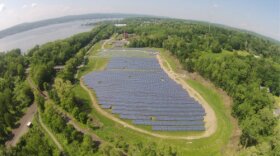Massachusetts has released two plans for achieving net zero greenhouse gas emissions by 2050.
The Commonwealth put forward the broader 2050 plan alongside an interim 2030 plan.
“We know that the cost of inaction will be devastating to our economy, our health, and our environment, which is why the Commonwealth is taking a leading role as the first state in the nation to release a comprehensive study showing how to achieve net zero emissions by 2050, and making sure that that context is part of our plan for this decade," said Energy and Environmental Affairs Secretary Kathleen Theoharides, who detailed both plans via virtual press conference. “After analyzing multiple pathways to net zero, we're confident that Massachusetts has the ability to achieve our ambitious 2050 climate goals. And if we're smart about the approach we take, and the strategies that we select, we can do so affordably and equitably, while maintaining a thriving economy and ensuring that we bring everyone along- especially our most vulnerable residents.”
The plans hinge on the expansion of clean energy for major usages like transportation and heating derived from sources like wind, hydropower, and the sun.
“To put us in the best position possible to achieve net zero, I'm setting an emissions limit of 45% below 1990 levels by 2030, which strikes the balance between setting us on the best course to hit our net zero goals while also balancing the economic costs,” said Theoharides.
Adapting existing technology will be a key part of the effort.
“We'll need to retrofit over a million homes, support highly efficient new construction and help people adopt clean heating solutions like air source heat pumps," said Theoharides. "We’ll also need to put over 750,000 new EVs on the road and achieve a 15% reduction in vehicle miles traveled. And we'll need to build and interconnect 6,000 megawatts of clean energy and modernize our electric grid to support the development of these new clean energy resources.”
The state will create new building energy codes and establish a new committee on clean heating.
“This work will build on the Department of Public Utilities study assessing the role of gas companies in ensuring a low-carbon future," said Theoharides. "And we'll explore strategies that enable the Commonwealth to achieve net zero emissions while safeguarding ratepayer interests and securing safe, reliable and affordable natural gas service. By the end of 2021, the commission and task force will recommend a structure for new long-term declining emissions caps for heating fuels used in the state. This would include natural gas, fuel oil and propane.”
The transportation sector will also be transformed.
“Massachusetts will join California in mandating that by 2035, 100% of light duty vehicles sold in the Commonwealth are zero emission vehicles will also continue to incentivize the purchase of new zero emissions vehicles through the MOR-EV program and support the continued build out of a robust smart statewide charging infrastructure to ensure we address concerns about range anxiety throughout the state,” said the secretary.
Theoharides said reducing car emissions would also address environmental and public health concerns.
“This includes a precipitous drop in air pollution, particularly in environmental justice communities currently overburdened with poor air quality, a connection we've seen increasingly as something that needs to be addressed due to poor outcomes from COVID-19 in communities high air quality," she said. "We also see savings in health costs of up to $100 million per year by 2030, and the creation of thousands of high quality local jobs.”
A public comment period on the state’s net zero plan is open through February.






